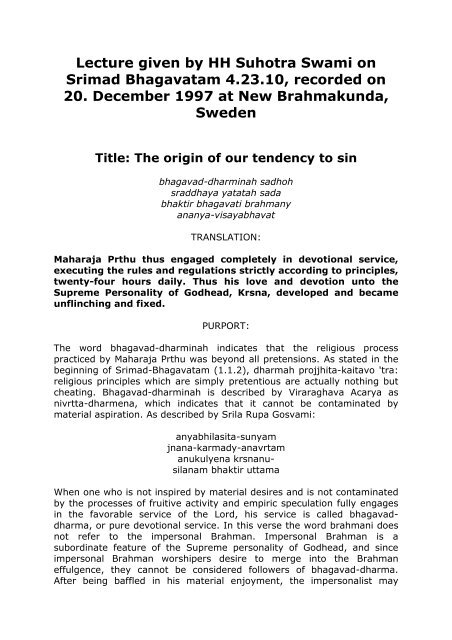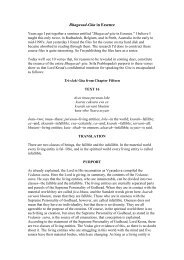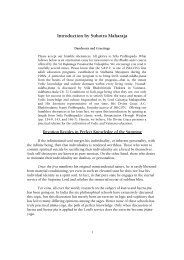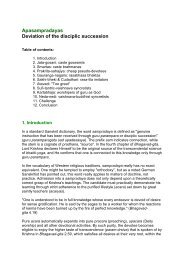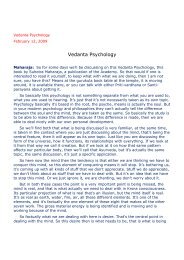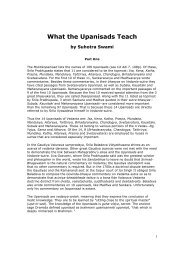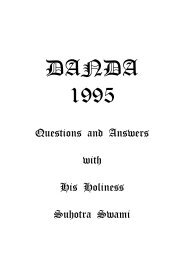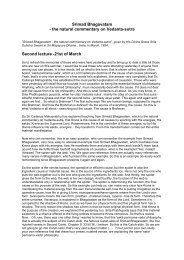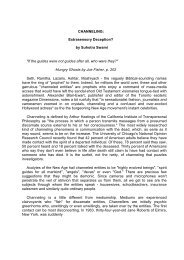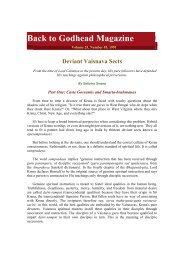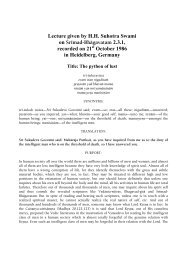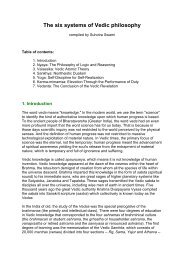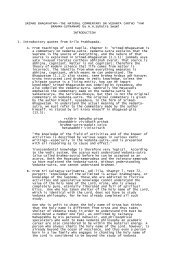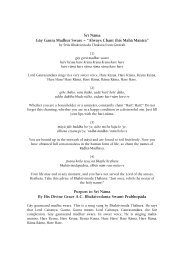C-431 - Suhotra Maharaja Archives
C-431 - Suhotra Maharaja Archives
C-431 - Suhotra Maharaja Archives
You also want an ePaper? Increase the reach of your titles
YUMPU automatically turns print PDFs into web optimized ePapers that Google loves.
Lecture given by HH <strong>Suhotra</strong> Swami onSrimad Bhagavatam 4.23.10, recorded on20. December 1997 at New Brahmakunda,SwedenTitle: The origin of our tendency to sinbhagavad-dharminah sadhohsraddhaya yatatah sadabhaktir bhagavati brahmanyananya-visayabhavatTRANSLATION:<strong>Maharaja</strong> Prthu thus engaged completely in devotional service,executing the rules and regulations strictly according to principles,twenty-four hours daily. Thus his love and devotion unto theSupreme Personality of Godhead, Krsna, developed and becameunflinching and fixed.PURPORT:The word bhagavad-dharminah indicates that the religious processpracticed by <strong>Maharaja</strong> Prthu was beyond all pretensions. As stated in thebeginning of Srimad-Bhagavatam (1.1.2), dharmah projjhita-kaitavo 'tra:religious principles which are simply pretentious are actually nothing butcheating. Bhagavad-dharminah is described by Viraraghava Acarya asnivrtta-dharmena, which indicates that it cannot be contaminated bymaterial aspiration. As described by Srila Rupa Gosvami:anyabhilasita-sunyamjnana-karmady-anavrtamanukulyena krsnanusilanambhaktir uttamaWhen one who is not inspired by material desires and is not contaminatedby the processes of fruitive activity and empiric speculation fully engagesin the favorable service of the Lord, his service is called bhagavaddharma,or pure devotional service. In this verse the word brahmani doesnot refer to the impersonal Brahman. Impersonal Brahman is asubordinate feature of the Supreme personality of Godhead, and sinceimpersonal Brahman worshipers desire to merge into the Brahmaneffulgence, they cannot be considered followers of bhagavad-dharma.After being baffled in his material enjoyment, the impersonalist may
desire to merge into the existence of the Lord, but a pure devotee of theLord has no such desire. Therefore a pure devotee is really bhagavaddharmi.It is clear from this verse that <strong>Maharaja</strong> Prthu was never a worshiper ofthe impersonal Brahman but was at all times a pure devotee of theSupreme Personality of Godhead. Bhagavati brahmani refers to one who isengaged in devotional service to the Personality of Godhead. A devotee'sknowledge of the impersonal Brahman is automatically revealed, and he isnot interested in merging into the impersonal Brahman. <strong>Maharaja</strong> Prthu'sactivities in devotional service enabled him to become fixed and steady inthe discharge of devotional activities without having to take recourse tokarma, jnana or yoga.LECTURE BY HH SUHOTRA SWAMI:So, Srila Prabhupada used the phrase "open secret" for the processof devotional service. Open secret means that there is nothing esoteric inthe teachings of Krsna consciousness. There is not, as in some mysticalprocesses, some front that is presented for common people, which ismisleading, and then behind, for those who are within the inner group...then there is so much detailed esoteric knowledge. It is not like that. Theprocess is open, accessible to everyone, just like Srila Prabhupada'sbooks. Everything is there for not even devotees, the common peoplethen the neophyte devotees then the advanced devotees in SrilaPrabhupada's books, everything according to one's level is presented, andthe members or distributors of this International society of KrsnaConsciousness are distributing Srila Prabhupada's books, the Bhagavadgita,Srimad-Bhagavatam, Caitanya-Caritamrta, all these books aredistributed. Anyone can read them. It is open, yet at the same time it is asecret. What is the secret? Actually here is the secret in this verse that<strong>Maharaja</strong> Prthu, he was very careful to execute rules and regulations ofdevotional service strictly 24 hours daily. "Thus his love and devotion untothe Supreme Personality of Godhead, Krsna, developed and becameunflinching and fixed." This is the secret actually entering into an intimatepersonal relationship with Krsna. The books of Srila Prabhupada,practically on every page, they are telling us that this is what we must do.But until you do it we can not actually know what it means to enter into aintimate personal relationship with Krsna.Many people, they theoretically appreciate the philosophy of Krsnaconsciousness, the philosophy of personalism, and scholars, they will bevery happy to much up what they read in Srila Prabhupada's books withstatements of saints and sages in other traditions. Like in... because thisis the Christian culture, they will look into the writings of Christiantheologians and saintly persons from the past, and they will say, "Yes!.Yes! It is the same." And they will appreciate that, "Oh! On this point thiswas made by saint so and so back in 1623." Because at present I am
studying some research on another book I am also reading some of theseold writings of saints etc. It's a fact. You can see, on many, many points,there is a common ground, but this is theoretical. The theoreticalconstruct can be similar, but what remains to be understood is the actualrasa or taste. On the material platform, this is just the point SrilaPrabhupada is making, anyabhilasita-sunyam jnana-karmady-anavrtam,this is the material platform that must be overcome. Prabhupada alsomentions that pure devotional service is nivrtti-dharma, and we weresaying this in last days, there is pravrtti-dharma, and this is the platformon which materialistic people stand.The Bhagavatam itself explains, nivrtti-tarsaih upagiyamanah thatthe nectar of this narration, every verse, every word in the Srimad-Bhagavatam is an ocean of nectar, but in order to enter into that one hasto be nivrtti-trsna, one has to have overcome all material desires. Untilone has done that one can see on the theoretical platform, as Prabhupadais saying... where is he saying?... just to get the words correct..."...fruitive activity and mental speculation..." Yes, one who is situated infruitive activity - karma and mental speculation - jnana, he may be able tofind so many similarities, surface similarities between Krsna consciousnessand some other process he himself is familiar with. I mean that's a fact.Especially in Vedic culture there are karmis, there are jnanis, and thereare devotees, and they are all accepting Vedic scriptures. Of course theyare accepting different bodies of Vedic scriptures, different lines ofteaching, but there is a basic similarity. Ultimately, included in the realmof Vedic knowledge, they are all bona fide religious traditions. So there issimilarity there. But it is a surface similarity. The real question, in terms ofunderstanding Srimad-Bhagavatam, is whether we've overcome ourmaterial inclinations, pravrtti means our material inclinations, whether wehave overcome that and actually entered into the bhakti-rasamrta-sindhu,the nectarian ocean of devotional service to the Supreme Personality ofGodhead. Until one has done that then one will continue to be baffled -moghasa mogha-karmano mogha-jnana vicetasah, this is Krsna's ownstatement in the Bhagavad-gita that those who are attracted bymaterialistic views then, actually, their activities and their knowledge willcontinue to be baffled.Why is one attracted to materialistic views? That is just the point -attraction, what is the center of our attraction. So this is, again coming tothe point of open secret, this is the secret, what is the center of ourattraction. This is the point that is very, very difficult for karmis and jnanisto understand. <strong>Maharaja</strong> Prthu, what is he doing here, he is showing theway to develop attraction, make the center of one's attraction in lifeKrsna. Ananya-visaya, to be firmly fixed without deviation in bhagavatdharma,in pure devotional service. How can one become firmly fixedunder all circumstances? It is only when one has this powerful attractionto Krsna. It is a question of love in the end, direct personal love for thisspecific Supreme Personality of Godhead, Krsna, as we see Him depicted
here in all these nice paintings. Therefore Srila Prabhupada is stressing inthis purport, dedicating practically two paragraphs, out of the purportthree paragraphs, to point out the difference between those who worshipimpersonal brahman and those worship the Supreme Personality ofGodhead. This impersonal brahman conception, it is divine conception, butit is conception that allows us to impose our own speculations upon it.Those who are fond of speculating on the spiritual path, depicting theobject of religious worship in this way or that way... and there are manypaths, there are many teachers, many this and many that... actually theyare all impersonalists. Even they appear to be personalist, they will speakof some personal object, but unless they have this nija-bhakti, which is aterm defined in Caitanya-Caritamrta, specific devotional service to Krsna,then they do not know what... actually what is personal spiritual life. Theycan not know it.People, who are fond of all this theoretical, theological, theosophicalapproach, they have hard time with that statement. They will think it issectarianism, "How can you say that only by worshipping Krsna alone canwe actually understand the full meaning of personal spiritual life?" And theanswer is that only Krsna, only the original Supreme Personality ofGodhead Himself is engaging all of the senses of His devotees in lovingdevotional service. Where only the mind is engaged or where only the fewstereotyped sensory activities are engaged then the balance, what is leftover, where will that be engaged? This is the question. The tendency,which is known in this material world as a tendency to sin, the tendencyto engage in those things which are forbidden in the scriptures, universallyforbidden, where does that tendency come from? This is the interestingpoint. As I have been reading, they hypothesize some enemy of God, theadversary, the devil, satan, and he is... as much as God is supposedlygood, satan is evil, and human being is in the middle. And so from thegood side are coming all the stereotyped religious activities, avoiding sinand going to the church or temple and praying and all these niceactivities. And all the bad things, the adultery, and so on and so forth,breaking of regulative principles that is coming from satan. Thisphilosophy is called dualism. This dualism, in other words this division,this dividing the reality into the realm of light and into the realm ofdarkness is inevitable for the impersonalists. This is the amazing thing.The impersonalists, those who worship brahman, apparently theyphilosophy is "everything is one", but practically speaking, everything isnot one. Therefore they have to divide, they have to speak of realm ofoneness, of pure light and this dark material world in which we are fallen.And they have to radically divide the two. And the connection between thetwo is a very, very difficult problem for them, is very, very difficult, andwhere one stands between these two is also very, very difficult toascertain, because even one comes to the side of the so-called light, thespirit, and is engaging those stereotyped spiritual activities, religiousactivities then it is seen that he can be tempted by the devil. So they cannever rid themselves of this dark side. Why is that? Because they don't
emain a problem. To remain fixed in spiritual life will always... there willbe so many, many, many, many difficulties. They call it, actually, thisproblem of evil, they call it. And they have no explanation for it,ultimately. They can see that there is good and there is evil, but whythere is evil, they don't know. That's a big problem. This is why theChristian religious tradition has become so weak in recent times, becauseof not having satisfactory answer to this problem. But in Krsnaconsciousness, actually, that problem is clearly explained and clearlysolved by those who take up anyabhilasita-sunyam jnana-karmadyanavrtam,who rid themselves of all other engagement, all other ways ofsatisfying their inward propensities anukulyena krsnanu-silanam bhaktiruttama, and who accept the process of uttama bhakti, pure devotionalservice. In other words, as stated here anukulyena krsnanu-silanam, theydo only that which is favorable for advancing their relationship with Krsna.And the ultimate example of that, Sri Caitanya Mahaprabhu said, is in thegopis. This is the supreme demonstration of love of Krsna. This is thecomplete engagement of the person, the spiritual person in love ofGodhead. Until one comes to that platform then that complete person isnot engaged fully, and that which is left over becomes a problem, that issubject to being captivated by illusion.OK. So I'll stop here. Are there any questions?Q: I was wondering what is the relationship of the gopis' husbands toKrsna?.They have their relationship in the sakhya-rasa, the friendship rasa toKrsna, and it's a little mysterious that this relationship between the gopis'husbands and the gopis themselves it is said to be apparent. It isapparent, it is not, actually, factual. The acaryas explain that thisapparent connection of the gopis to the cowherd men, as wives tohusbands, is a kind of manifestation of obstructions in pure devotionalservice. Not that they are not pure devotees, but... the depth of love ofGodhead is unlimited. In other words, as advanced as any devotee maybe, he has unlimited advancement before him, because the process isalways expanding, and so they are always newer and newer obstacles thatmust be overcome, and this is all arranged by Krsna. It's not like in thematerial world where the obstacle is of material nature. In the spiritualworld there are also obstacles but they are presented by spiritual nature,and we have to overcome them. This is one such obstacle that the gopishave their duty to their apparent husbands, but it is only apparent, and soas they overcome that, they enter into deeper and deeper lovingexchanges with Krsna.In Goloka Vrndavana, this is a good point, indirect point in yourquestion, devotees reside there, who have other relationships with Krsnabesides this madhurya relationship. There is Nanda <strong>Maharaja</strong>, MotherYasoda, Krsna's parents, and there are Krsna's friend, and there are alsothose who assume the role of Krsna's friend, and even there are those
who are in the santa rasa, like the cows and trees and so on. One may askthat "Oh, but what about them?" But the thing is that predominant rasa inGoloka Vrndavana is madhurya rasa, and all these other rasas servingthat rasa, and they also in the ocean of madhurya rasa. Other devotees inGoloka Vrndavana, of course they another different relationship withKrsna, they may not be going to directly dance with Krsna in the rasadance, but they are serving that, and thus the nectar of these mostintimate pastimes are flooding all of Goloka Vrndavana, everyone istasting that nectar.In the end, in Goloka Vrndavana, that is the predominant rasa. EvenLord Krsna's... rather Srimati Radharani's mother in law and sister in law,Jatila and Kutila, they are always criticizing Krsna, they are always tryingto protect Radharani from having any contact with Krsna, they are very,very sharp tongued. These wonderful pastimes, how they are trying tointerfere with Krsna's meeting with Radharani in different ways, but evenhere, their activities are only enhancing the rasa, the intimaterelationship. That's making it only sweeter and sweeter. Even in thisway... they become mad, Jatila, Kutila, when they are criticizing Krsna forHis meeting the gopis in the forest, they are glorifying those pastimes in acritical way. Like women who gossip about love affairs of other women,they heard about, and they in a very scandalized way (imitates thegossip) (everybody laughs) They are actually tasting the same rasa, but inthat way. This is a wonderful feature of Goloka Vrndavana that everybodyis absorbed in this relationship from their different standpoints, and eventhere are different devotees who are completely scandalized by it.(laughs) It's just like... it's reflected in the material world... these women,house wives, who are speaking in such a scandalized way about someaffairs of some other women that they know that, some neighbor women,she is married, but we know that she is seeing another man too, and theytalk for hours and hours about it in such outrageous tone of voice, butactually they are enjoying the whole thing. (everybody laughs) They arealways saying how horrible it is, but you just see, they can't stop talking.(laughs) This is reflected in the material world. The origin is in the spiritualworld.Everyone in Goloka Vrndavana, ultimately, they are absorbed in this onerasa, this one relationship between Krsna and Radharani, the gopis. Thatis the life and soul of every one, that is the subject matter every one istalking about. That is the nectar every one is tasting.Anything else?Srila Prabhupada ki! Jaya!(THE END)


